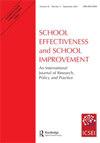School turnaround through network governance: the role of turnaround schools in China’s Shanghai City
IF 2.8
3区 教育学
Q1 EDUCATION & EDUCATIONAL RESEARCH
引用次数: 2
Abstract
ABSTRACT Collaboration and networking have been widely recognized and adopted as strategies for school turnaround. However, most studies focus on external forces’ (particularly governments’) role in promoting collaborative turnaround, paying less attention to turnaround schools’ reactions to external actors. With specific reference to Shanghai, China, this qualitative empirical study examines the complexity of schools’ role in school turnaround through network governance. Drawing on document review and interview data, this study found three patterns of turnaround schools’ interactions with local governments and third-party actors in different school turnaround networks – compliant follower, reserved enforcer, or rational aspirant. Turnaround schools’ differentiated responses to external actors in China’s collaborative turnaround indicated their different awareness and capacity to utilize external resources. This resulted from schools’ different levels of disadvantage and leadership and external actors’ different extents of power exercise and differently impacted schools’ positions and power relations with external actors.通过网络治理实现学校转型:转型学校在中国上海的作用
合作和网络已经被广泛认可并采用为学校转型的策略。然而,大多数研究都关注外部力量(尤其是政府)在促进合作转型中的作用,而较少关注转型学校对外部行为者的反应。本研究以中国上海为例,定性实证研究考察了学校通过网络治理在学校转型中所扮演角色的复杂性。根据文件审查和访谈数据,本研究发现,在不同的学校转型网络中,转型学校与地方政府和第三方参与者的互动有三种模式——顺从的追随者、保留的执行者或理性的追求者。在中国的合作转型中,转型学校对外部行为者的不同反应表明它们利用外部资源的意识和能力不同。这是由于学校不同程度的劣势和领导力,以及外部行为者不同程度的权力行使,对学校的地位和与外部行为者的权力关系产生了不同的影响。
本文章由计算机程序翻译,如有差异,请以英文原文为准。
求助全文
约1分钟内获得全文
求助全文
来源期刊

School Effectiveness and School Improvement
EDUCATION & EDUCATIONAL RESEARCH-
CiteScore
6.60
自引率
0.00%
发文量
23
期刊介绍:
School Effectiveness and School Improvement presents information on educational effectiveness, practice and policy-making across primary, secondary and higher education. The Editors believe that the educational progress of all students, regardless of family background and economic status, is the key indicator of effectiveness and improvement in schools. The journal strives to explore this idea with manuscripts that cover a range of subjects within the area of educational effectiveness at the classroom, school or system level, including, but not limited to: •Effective pedagogy •Classroom climate •School ethos and leadership •School improvement and reform programmes •Systemwide policy and reform
 求助内容:
求助内容: 应助结果提醒方式:
应助结果提醒方式:


